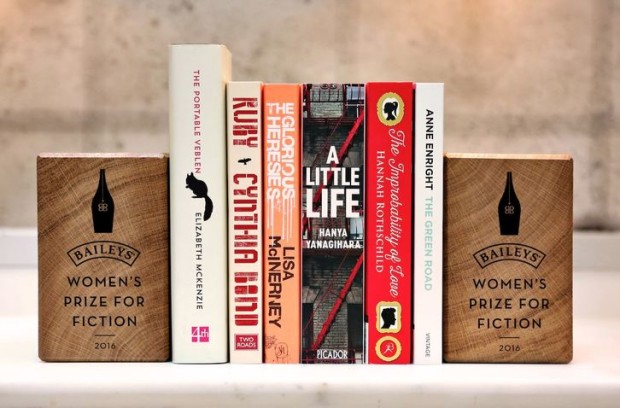You have no items in your cart. Want to get some nice things?
Go shopping
It was announced on Monday, so there’s been plenty of time for the major news outlets to publish pieces outlining the list’s content. There’s been less, I notice, in the way of analysis, apart from the standard nationality count (only one British person on this list, two Irishwomen and three Americans). That’s curious, I think, given the amount of critical coverage that the Baileys Prize (formerly the Orange Prize) has received in past years. This shortlist in particular seems to encapsulate some of the controversies that have surrounded the prize as a whole, and it’s worth discussing that.
The first thing about this shortlist, of course, the thing that even the mostly impartial websites have noted, is that Kate Atkinson isn’t on it. This is beyond ridiculous. Atkinson has now been passed over for prizes and shortlists so many times that she’s this generation’s Beryl Bainbridge, but it’s no longer funny, if it ever was; instead, it’s alarming as hell, because Atkinson writes very, very good fiction. There are plenty of hypotheses floating around as to why she is so often overlooked, one of which is that she straddles the (thin, almost illusory in some places) line between popular and literary fiction in a way that confuses people (where, for “people”, read “literary judges”). For the Man Booker Prize, this may well be true, but what I don’t understand is how this can possibly be a problem for the judging panel of the Baileys Prize. This is a prize, after all, which has frequently been accused of representing “women’s fiction”, as opposed to “fiction by women”; the comments of judge Daisy Goodwin in 2010 about “misery lit” did nothing to dispel that public image. The intersection of the commercial and the meritorious is precisely where the Baileys Prize has historically positioned itself, regardless of whether its results have reflected both sides equally (we’ll get to that in a minute). Atkinson is the Platonic ideal of “writer who should be on the Baileys Prize shortlist”.
If it were merely that Atkinson fits the profile, I would understand her exclusion, but it is also the case that her longlisted novel, A God In Ruins, is excellent. Meticulously written, with a sweeping intergenerational focus and some of the best scene-setting I’ve read for a long time, it manages also to be a page-turner, the flow of its sentences uninterrupted by any rhythmic awkwardness or inauthentic dialogue. I was deeply reluctant to read it at first, because I am bored to death of WWII novels, but it is hardly a WWII novel at all; it’s a life novel, a half-century novel, a ruthless novel.
Many people who talk about it mention the twist at the end. I’m willing to admit that a single plot twist doesn’t make it a particularly innovative novel, intellectually or structurally. I’m not willing to admit, however, that all of the books on the shortlist as it currently stands are more challenging or creative. They are certainly not all written with anything like as thorough a grasp on language and plot as Atkinson demonstrates.
Before you ask: yes, I am targeting one book in particular. There is always one, I know, whose place on the shortlist seems completely random, compromise-driven. Perhaps that’s precisely the case; getting five people to unanimously agree on the merits of six books is incredibly difficult, and actual winners of literary prizes—let alone shortlists— have been compromises before now. But that is no excuse, no excuse at all, for a shortlist that implies that one of the best six books written by a woman in English this year was The Improbability of Love, by Hannah Rothschild.
For one thing, there are at least two books on the longlist—this, mind you, is only out of the selection that I’ve read—that used the medium of language in ways more fluid, more natural, and more genuinely impressive: Shirley Barrett’s Rush Oh! and Becky Chambers’s The Long Way to a Small Angry Planet. Barrett’s protagonist, teenaged Mary Davidson, is a surrogate mother for her siblings, a surrogate housewife for her father, and far too dry and intelligent to be appreciated by the bachelors that surround her. Her narration is witty, never anachronistic or “feisty” (the worst descriptor for literary heroines), always tinged with the sorrow of hindsight. It’s Barrett’s debut novel; that she’s managed such subtlety in her prose the first time round is something worth celebrating. Chambers’s novel, also a debut, vividly imagines the settlement of space and the logistics of galactic government, as well as dealing with delicate emotional beats in a way that’s totally unforced and provokes a genuine emotional response in the reader. It’s also not afraid to go off-piste; I’m sure there are other love stories between an AI and a human with dwarfism, somewhere in the annals of science fiction, but I’ll bet this one is the most sensitively written.
Rothschild’s book, meanwhile, is—to put it politely—somewhat bland. It’s also a mess. You’d think that a novel featuring an exiled Russian gangster, the murder of an academic and the rediscovery of a long-lost painting would be able inherently to avoid blandness; you would be wrong. The protagonist, Annie McDee, never seems quite real, her personality swallowed up by the Eat-Pray-Love nature of her storyline (cruelly dumped by long-term boyfriend, she moves to London, learns to love herself by cooking huge, elaborate dinners, exchanges angsty psychobabble with her alcoholic mother and falls in love with a cute gallery tour guide and aspiring artist, who’s obviously better than her ex). Meanwhile, the story pings around half a dozen point-of-view characters, becoming increasingly ludicrous—even, I think, granted that it’s set in the larger-than-life art world. When one of your major plot points revolves around the existence of a secret Nazi hoard, whether it’s of gold or of paintings, you have jumped the shark.
I’d have been willing to give its narrative predictability a pass, even so, if it hadn’t been so appallingly under-proofed. Either out of a conviction that it creates tension and portentousness, or out of a genuine inability to recognise stilted dialogue, The Improbability of Love has been allowed to go to press with all of its characters eschewing contractions entirely, so that they say things like “You are not” and “I have never”, instead of “You’re not” and “I’ve never”. Lest you think this is nit-picking, try and think of the last time someone said “You are not” to you without implied italics on the negative. No one speaks like this; certainly not privileged twenty-first century Londoners. If it didn’t have this problem, it would be a fun, slightly over-long confection; with the errors, the whole book feels like an imposition.
There’s one possible reason for the weirdness of this shortlist, and shortlists in the past, that no one wants to talk about: what if the judges simply aren’t very well qualified? It’s not going to be a popular view, I know, and to an extent I agree that you don’t have to be a World Expert to have good judgement, but…I’m not sure this is the way to go either. Think for a moment about what literary judges are asked to do, and think about how much their day jobs have prepared them to do it. The Baileys Prize is this year being judged by a former advisor to Lord Alan Sugar, a journalist, a television presenter, a musician, and a novelist. All of them (hopefully) intelligent and thoughtful readers, but how many of them are accustomed to critically assessing a high volume of books on a regular basis? 150 books in a year is a huge demand to make of anyone, let alone very very busy people who may not be approaching the task with anything other than a gut feeling. And the worst part is that gut feelings have their place in criticism. It’s just that other things, like the quality of the writing and the originality of the project, do too–and I don’t always see those things getting the recognition they deserve.

About Eleanor Franzen
Eleanor Franzén is a London-based writer and editorial assistant. She blogs about books at Elle Thinks (https://www.ellethinks.wordpress.com).




